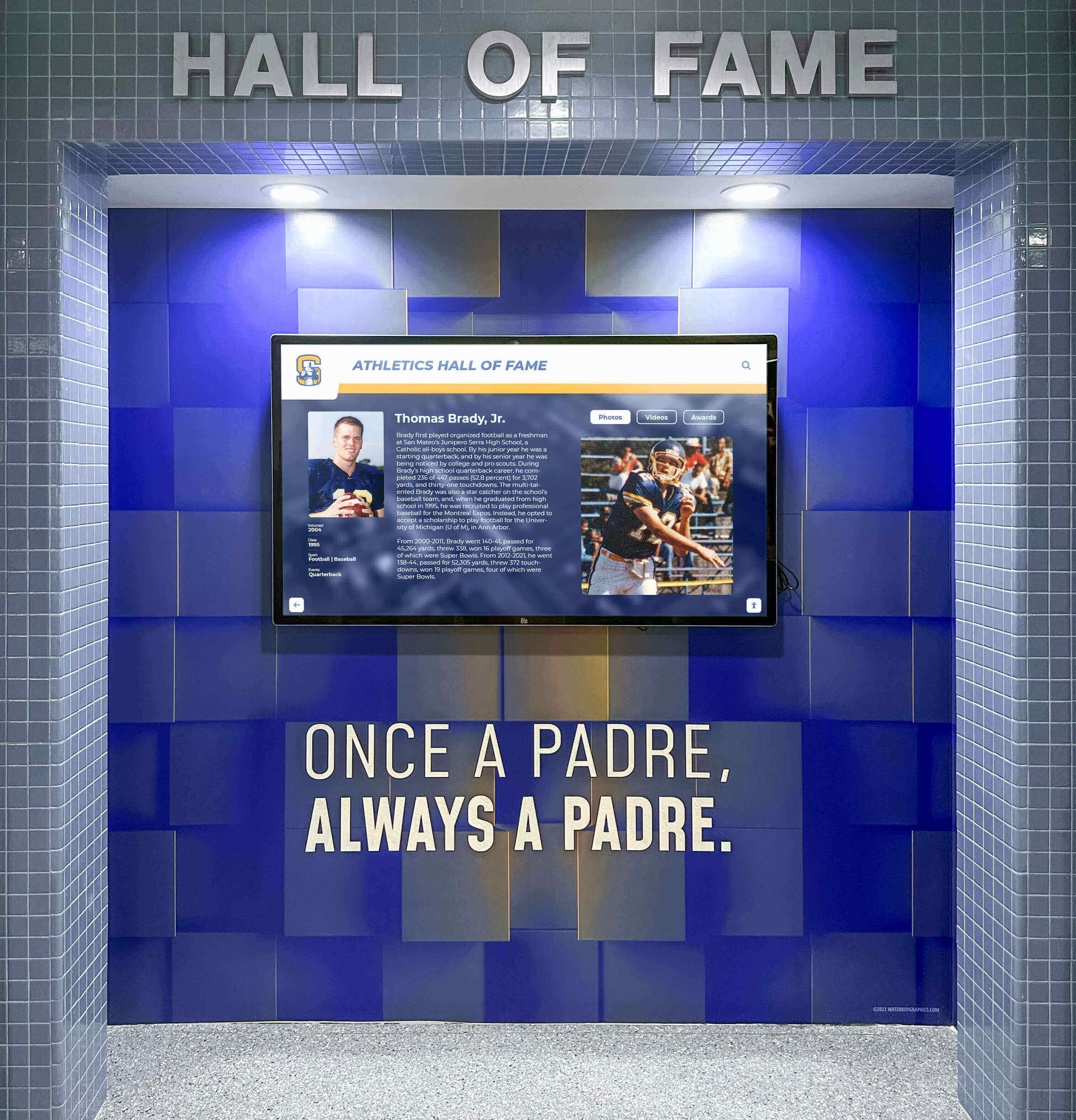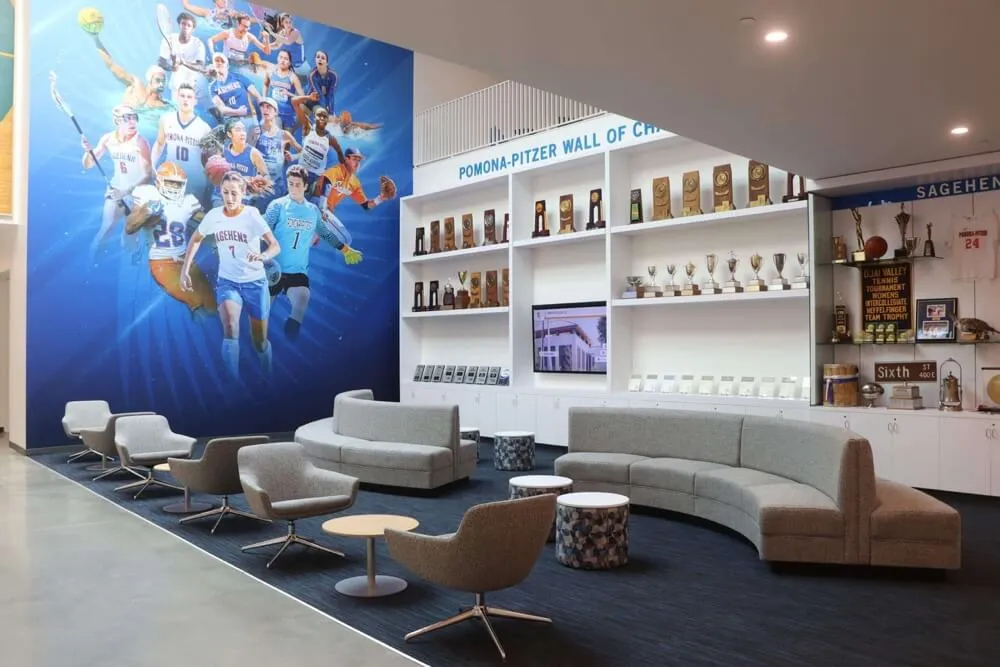Key Takeaways
Explore how digital touchscreen displays can transform Philadelphia Flyers history recognition at Wells Fargo Center. Discover modern solutions for celebrating Broad Street Bullies legacy, championship teams, and legendary players through interactive technology.
The Philadelphia Flyers: A Legacy Built on Excellence and Toughness
The Philadelphia Flyers entered the National Hockey League as part of the 1967 expansion, joining five other teams in doubling the league’s size from the Original Six. Under the ownership of Ed Snider and leadership of general manager Keith Allen, the Flyers quickly established themselves as an organization committed to winning through a unique combination of skill, determination, and physical intimidation.
From Expansion Team to Champions
Within just seven years of their founding, the Flyers became the first expansion team to win the Stanley Cup, defeating the Boston Bruins in 1974. They repeated this achievement the following year against the Buffalo Sabres, establishing a dynasty built on defensive responsibility, opportunistic offense, and unmatched physical play.
The "Broad Street Bullies" nickname emerged from the team's aggressive style that intimidated opponents while energizing Philadelphia fans. This identity combined genuine skill—Bobby Clarke won three Hart Trophies as league MVP—with toughness that made the Flyers nearly impossible to play against in playoff hockey.
Beyond the championship years, the Flyers have established one of the NHL's most consistent winning traditions, making the playoffs more frequently than any other NHL franchise and reaching the Stanley Cup Finals eight times through 2010.
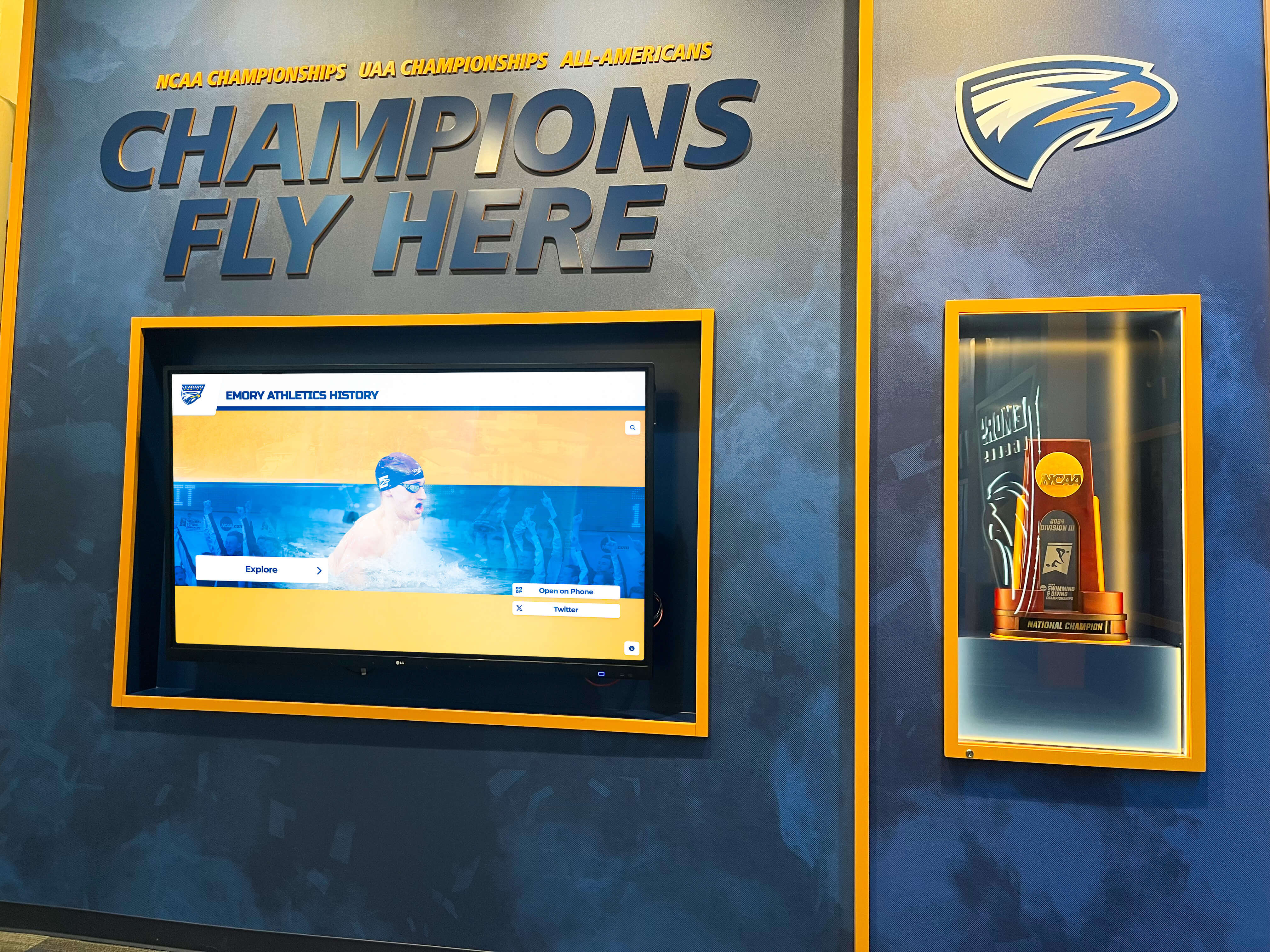
The Flyers Hall of Fame Tradition
Wells Fargo Center (formerly Wachovia Center and CoreStates Center) features a Flyers Hall of Fame that honors the franchise’s greatest contributors. Established to preserve team history and recognize exceptional achievement, the Hall of Fame includes legendary players like Bobby Clarke, Bernie Parent, Bill Barber, Eric Lindros, and Mark Recchi, along with builders like founder Ed Snider.
The Hall of Fame also celebrates retired numbers—#1 (Bernie Parent), #2 (Mark Howe), #4 (Barry Ashbee), #7 (Bill Barber), #16 (Bobby Clarke), and #19 (Eric Lindros)—whose jerseys hang from the rafters as permanent reminders of individual excellence and franchise impact.
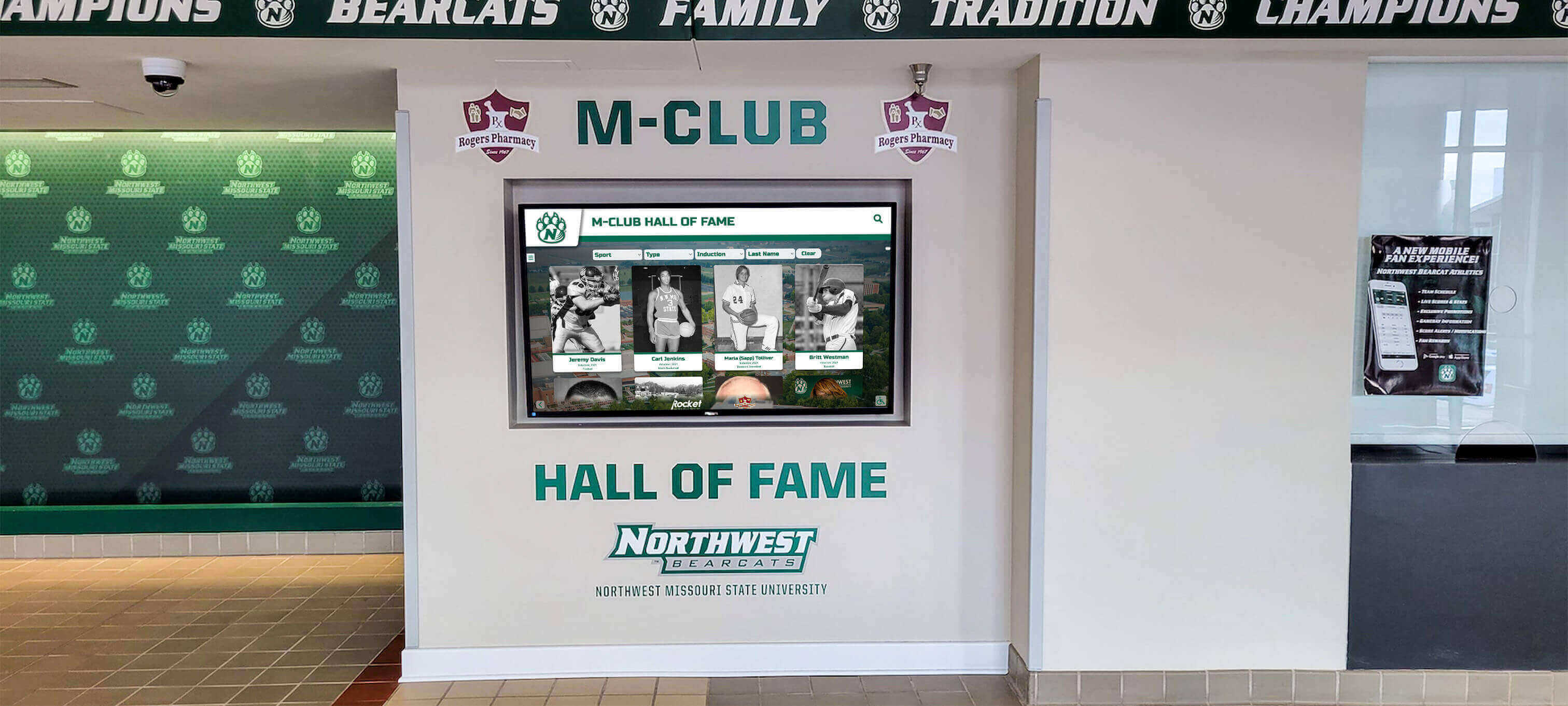
The Challenge of Traditional Recognition in Modern Arenas
While the Flyers have implemented various recognition elements throughout Wells Fargo Center—including banners, display cases, and wall exhibits—traditional approaches face inherent limitations that restrict comprehensive storytelling and fan engagement.
Space Constraints and Capacity Limits
Physical displays require valuable arena real estate. Trophy cases can only hold limited items before becoming cluttered and difficult to navigate. Wall space for photographs and plaques remains finite, forcing difficult decisions about which achievements to display prominently versus which to relegate to storage or less visible locations.
As the franchise continues accumulating history—new Hall of Fame inductees, additional achievements, updated player statistics—space constraints force either expansion (requiring construction costs and physical space) or selective removal of existing content to accommodate new additions.
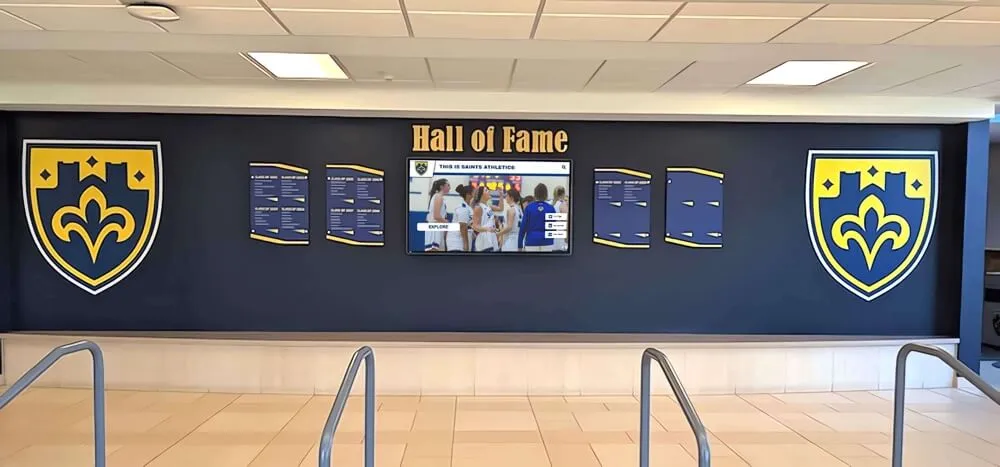
Limited Engagement and Depth
Traditional recognition methods provide minimal information beyond basic facts. A photograph identifies who played on a championship team, but reveals nothing about individual contributions, memorable moments, statistical achievements, or the narrative that defined the season.
Fans visiting Wells Fargo Center can see that the Flyers won Stanley Cups in 1974 and 1975, but traditional displays offer limited context about how these championships were achieved, which players delivered crucial performances, or the specific games and series that built toward ultimate success.
This shallow engagement represents missed opportunities for deeper fan connections with franchise history and reduced value from recognition investments.
Maintenance and Update Challenges
Physical displays require manual modification for updates. Adding new Hall of Fame inductees means fabricating new plaques, modifying display cases, or creating new signage—processes that prove time-consuming and expensive while creating gaps between achievements occurring and recognition appearing.
Statistical records evolve as players continue careers or historical research uncovers previously unknown information. Updating physical displays to reflect these changes demands reconstruction rather than simple content edits, often resulting in outdated information remaining displayed for extended periods.
Organizations celebrating championship excellence understand these challenges and increasingly explore modern championship recognition solutions that address traditional limitations while enhancing fan engagement.
Revolutionary Digital Touchscreen Recognition for the Flyers
Modern touchscreen technology transforms how sports franchises can celebrate history, honor achievements, and engage fans through interactive experiences impossible with traditional static displays.
The Digital Advantage for Hockey Recognition
🏒 Unlimited Recognition Capacity
A single touchscreen display can showcase every player in franchise history, every season's roster and statistics, every Hall of Fame inductee, and every significant achievement without space constraints limiting content.
📊 Rich Multimedia Storytelling
Video highlights of Bobby Clarke's playoff heroics, Bernie Parent's championship goaltending, and Eric Lindros's dominant play bring franchise history to life in ways static photos cannot match.
🎯 Interactive Fan Engagement
Fans search for favorite players, explore specific seasons, compare statistics across eras, and discover connections between different periods of franchise history through intuitive touchscreen interfaces.
⭐ Easy Content Updates
Cloud-based management enables immediate recognition of new Hall of Fame inductees, statistical record updates, and additional content without physical modifications or vendor involvement.
Modern touchscreen wall of fame solutions provide capabilities specifically designed for comprehensive sports recognition that traditional approaches cannot replicate efficiently or affordably.
Celebrating the Broad Street Bullies Era
The 1970s championship teams represent the franchise’s defining period—an era when the Flyers established their identity and achieved the ultimate success. Digital recognition enables comprehensive celebration of these legendary teams through rich content impossible to display traditionally.
Championship Team Documentation:
- Complete rosters with player profiles and biographical information
- Season-by-season records, statistics, and playoff progression
- Game-by-game playoff summaries from both championship runs
- Video highlights of championship-clinching goals and crucial saves
- Photo galleries capturing celebrations, team gatherings, and iconic moments
- Statistical leaders and individual achievements
- Coaching staff profiles and system explanations
Key Players from Championship Era:
Bobby Clarke: The heart and soul of championship teams, Clarke combined elite two-way play with fierce competitiveness. His three Hart Trophies as league MVP and relentless playoff performances defined Flyers excellence. Digital displays can showcase his statistical progression, memorable moments, leadership qualities, and post-playing career as team executive.
Bernie Parent: “Only the Lord saves more than Bernie Parent” became the rallying cry as the Hall of Fame goaltender delivered two Vezina Trophies and two Conn Smythe Awards as playoff MVP during championship seasons. His acrobatic saves and championship composure deserve rich multimedia recognition.
Bill Barber: The skilled winger provided offensive firepower, scoring 50 goals in 1975-76 and consistently delivering crucial playoff production. His 420 career goals established him as one of franchise history’s greatest scorers.
Dave Schultz: The legendary enforcer exemplified Flyers toughness, setting NHL penalty minute records while protecting teammates and intimidating opponents. His role in championship success demonstrates that winning teams require diverse contributions.
Organizations preserving hockey history implement comprehensive championship documentation that celebrates complete team stories rather than reducing achievements to basic statistics.
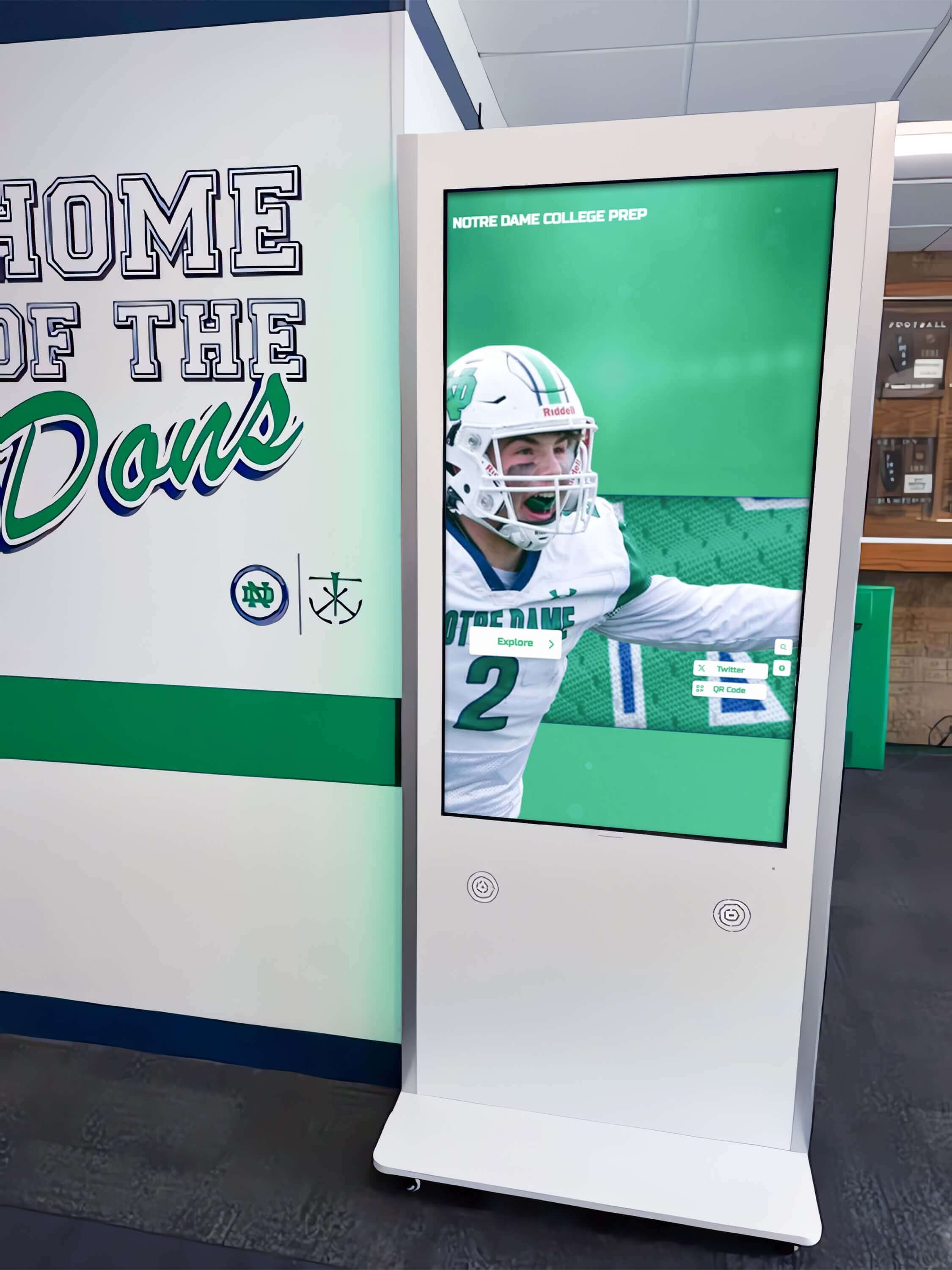
Essential Content for Flyers Touchscreen Recognition
Comprehensive digital recognition requires systematic content development across multiple categories ensuring fans can explore franchise history from numerous perspectives.
Player Profiles and Career Documentation
Every player who wore the orange and black deserves appropriate recognition proportional to their contributions and tenure. Digital platforms enable detailed player documentation including:
Comprehensive Profile Elements:
- Full career statistics (games, goals, assists, points, plus-minus)
- Season-by-season breakdowns showing performance progression
- Notable achievements and individual awards
- Memorable games and clutch performances
- Biographical information and personal background
- Photos from different career stages
- Video highlights showcasing playing style and significant moments
- Quotes about their Flyers experience
- Post-playing career updates and accomplishments
This depth ensures legends like Clarke, Parent, and Lindros receive extensive recognition while role players and shorter-tenure contributors gain appropriate acknowledgment for their franchise participation.
Season-by-Season Historical Archive
Building Complete Franchise History
The Championship Seasons
- 1973-74 Season: First expansion team to win Stanley Cup, defeating Boston 4-2 in Finals
- 1974-75 Season: Repeat championship over Buffalo, establishing dynasty
- Stanley Cup Finals Appearances: 1976, 1980, 1985, 1987, 1997, 2010
- Conference Championships: Multiple Eastern Conference titles
- Division Dominance: Numerous division championships across different eras
Season Documentation Elements
- Regular Season Records: Complete game results and standings
- Roster Information: Every player who suited up that season
- Statistical Leaders: Goals, assists, points, goaltending stats
- Playoff Performance: Series results and memorable moments
- Notable Events: Trades, signings, milestones achieved
- Coaching Staff: Head coaches and assistant recognition
Complete season archives enable fans to explore any year in franchise history, discovering how different eras compared and understanding franchise evolution over decades.
Hall of Fame Inductee Recognition
The Flyers Hall of Fame honors franchise legends who made exceptional contributions. Digital recognition transforms simple inductee listings into rich biographical celebrations:
Hall of Fame Content Requirements:
- Induction ceremony video and photos
- Career achievement summaries and statistical highlights
- Franchise impact narratives explaining significance
- Comparison to other Hall of Famers establishing historical context
- Personal reflections and acceptance speech excerpts
- Connections to other inductees (teammates, opponents, mentors)
- Post-induction updates and continued franchise involvement
This comprehensive approach ensures Hall of Fame recognition matches the honor’s significance while educating younger fans about why specific individuals earned selection.
Programs implementing coaching appreciation recognition properly acknowledge that championship success requires exceptional leadership alongside talented players.
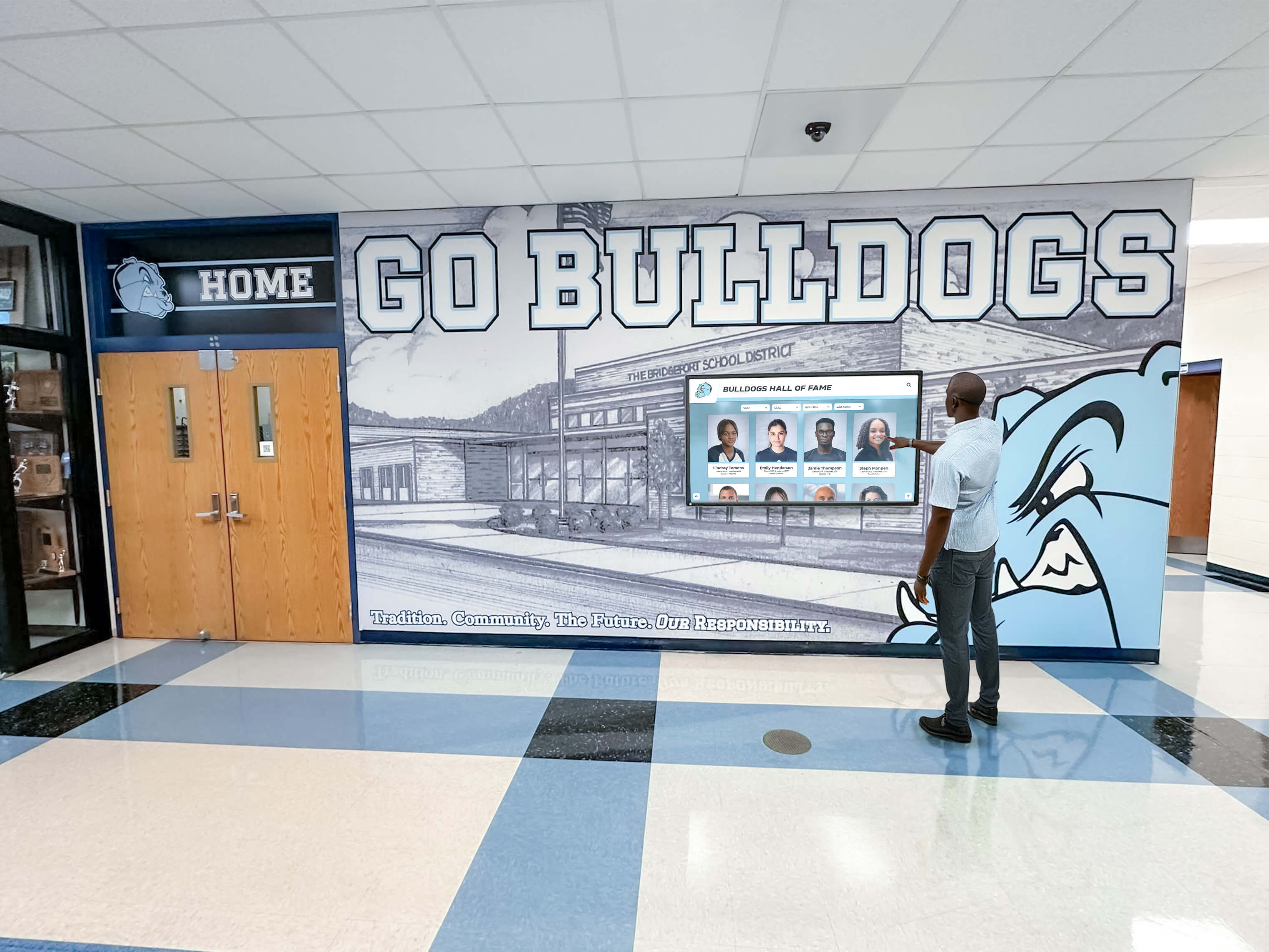
Strategic Placement and Fan Experience Design
Thoughtful placement and interface design maximize digital recognition’s impact on fan engagement, franchise pride, and visitor experience.
Optimal Location Strategy at Wells Fargo Center
Main Concourse Display: Position a prominent touchscreen in the main concourse where heavy foot traffic ensures maximum visibility. This central location captures fans arriving early, browsing during intermissions, and celebrating after victories.
Club Level Recognition: Dedicated displays in premium seating areas provide engaged fans with deeper historical content while they enjoy extended arena visits. These locations accommodate longer interaction sessions without blocking high-traffic pathways.
Team Store Integration: Touchscreen displays near or within the team store create natural connections between historical appreciation and merchandise purchases. Fans exploring Eric Lindros’s career statistics may decide to purchase his jersey, while learning about championship teams inspires memorabilia collection.
Lobby Installation: The main entrance offers opportunities for comprehensive displays introducing franchise history to all visitors—casual fans, opposing team supporters, and first-time arena guests—creating positive first impressions and establishing franchise prestige.
Multiple strategic locations ensure diverse fan segments encounter recognition displays while accommodating different engagement patterns—quick browsing for some, extended exploration for dedicated enthusiasts.
Enhancing the Fan Experience
Interactive Features That Engage
- Powerful Search: Fans instantly locate favorite players by name, number, or position
- Era Browsing: Explore franchise history by decade or specific season
- Statistical Filters: Discover scoring leaders, goaltending records, or team achievements
- Comparison Tools: Compare players from different eras using standardized metrics
- Video Highlights: Watch memorable goals, saves, and championship moments
- Photo Galleries: Browse extensive image archives from throughout franchise history
- Share Functions: Social media integration enabling fans to share favorite discoveries
Intuitive navigation ensures fans of all ages and technical abilities can explore content easily while discovering connections and information they didn't know they wanted to find.
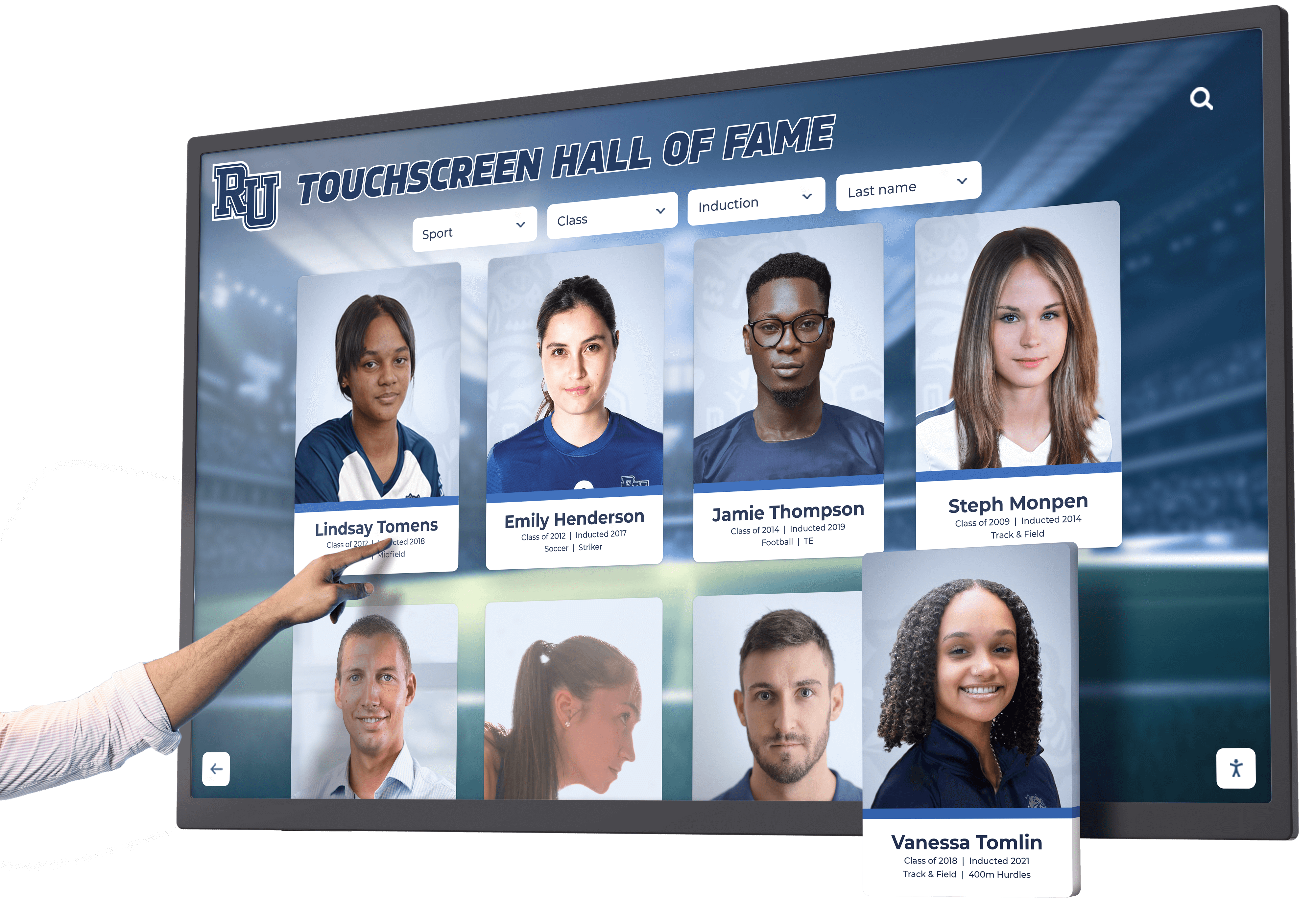
Mobile and Web Integration
Modern recognition extends beyond physical displays through web-accessible platforms enabling global fan engagement. Flyers supporters worldwide can explore franchise history online, maintaining connections regardless of geographic location.
Online Platform Benefits:
- Alumni players revisit their careers and share memories with family
- Fans research history before attending games
- Social sharing spreads franchise pride across networks
- Content remains accessible year-round beyond game days
- Global reach extends Flyers brand internationally
Organizations implementing comprehensive recognition discover that online hall of fame platforms create year-round engagement extending far beyond physical venue limitations.
Celebrating Rivalries and Memorable Moments
The Flyers’ history includes intense rivalries and unforgettable moments that digital recognition can celebrate through rich multimedia storytelling.
The Battle of Pennsylvania
The rivalry between Philadelphia Flyers and Pittsburgh Penguins represents one of hockey’s most intense competitions. Geographic proximity, playoff battles, and contrasting styles create natural drama that captivates fans from both cities.
Digital displays can document this rivalry through:
- Head-to-head records and notable game results
- Playoff series summaries and memorable moments
- Individual player performances in rivalry games
- Video highlights of dramatic goals and fights
- Fan perspectives and cultural significance
- All-time series leaders in scoring and penalties
- Coaching matchups and tactical battles
Historic Playoff Series
Beyond championships, numerous playoff series created lasting memories:
1987 Finals vs. Edmonton: The Flyers’ extended the mighty Oilers to seven games before falling short against Wayne Gretzky’s dynasty
2010 Stanley Cup Run: The improbable comeback from 0-3 deficit against Boston in Conference Semifinals, followed by Finals appearance against Chicago
Intense Rivalry Battles: Memorable playoff series against Rangers, Devils, and Penguins that defined different eras
Each significant series deserves comprehensive documentation including series summaries, game-by-game results, statistical leaders, video highlights, and cultural impact narratives.
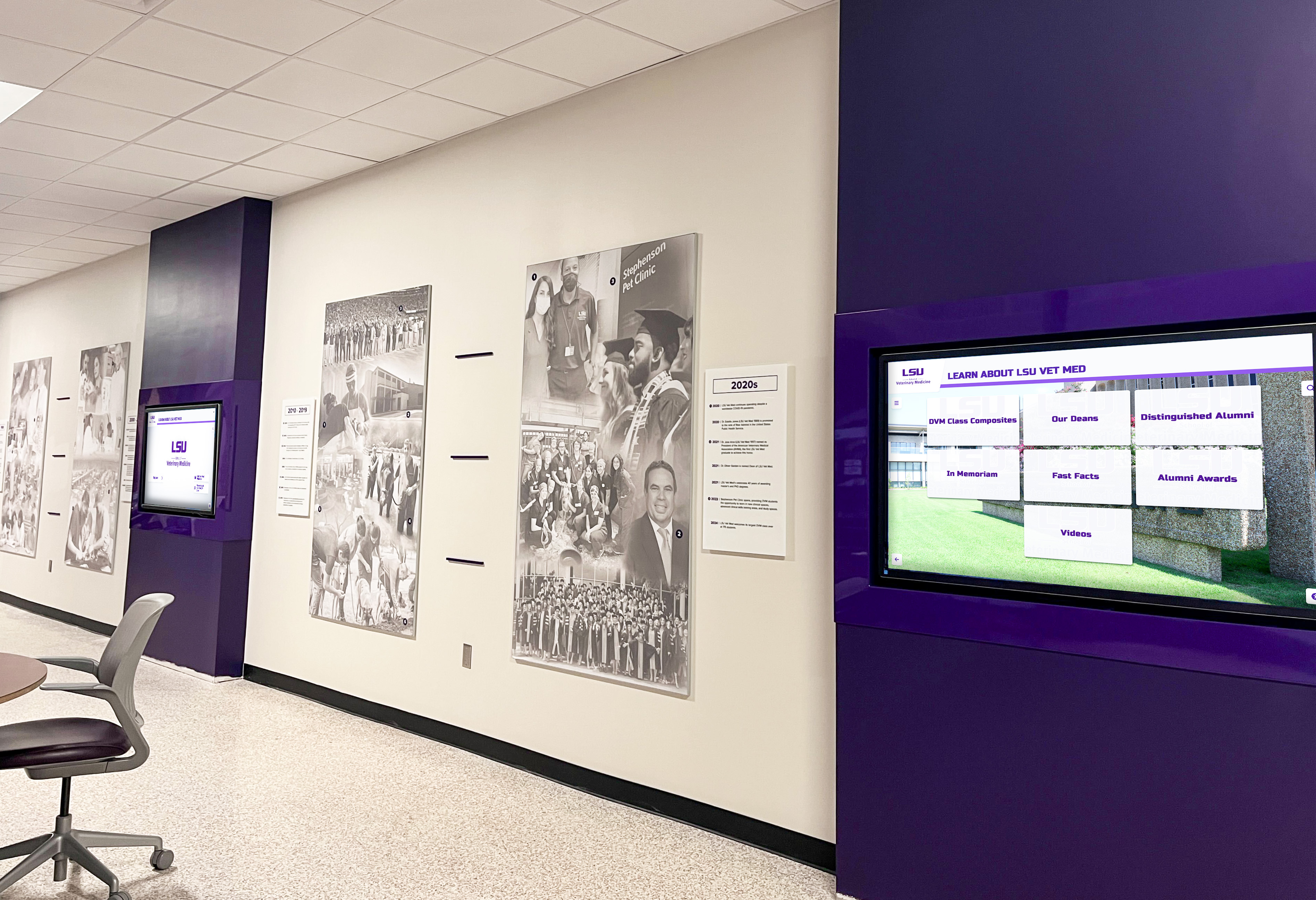
Beyond Players: Recognizing the Complete Flyers Family
Championship organizations succeed through contributions from diverse individuals beyond those who played. Comprehensive recognition acknowledges everyone who built franchise excellence.
Coaching Legends
Fred Shero: The mastermind behind championship teams, Shero’s innovative approaches and memorable quotes defined an era. His pre-game notes and strategic systems deserve extensive documentation explaining how he revolutionized coaching.
Pat Quinn: Led the Flyers to the 1980 Stanley Cup Finals as an unexpected contender, demonstrating coaching impact on team performance.
Mike Keenan: Guided the 1985 and 1987 Finals teams with demanding approaches that maximized player performance.
Terry Murray, Ken Hitchcock, Peter Laviolette: Modern coaches who sustained excellence and reached Finals, maintaining franchise’s competitive tradition.
Builders and Executives
Ed Snider: The founding owner whose vision created the franchise and sustained commitment to winning established organizational culture. His impact extends far beyond hockey through community contributions and arena development.
Keith Allen: The general manager who built championship rosters through smart drafting, strategic trades, and creating the environment where Broad Street Bullies identity flourished.
Bob Clarke: Transitioned from playing legend to successful executive, serving as general manager and guiding multiple Finals teams during the 1980s and 1990s.
Paul Holmgren: Player turned coach turned executive, demonstrating franchise loyalty and sustained leadership.
Programs honoring complete organizational contributions implement comprehensive recognition strategies celebrating diverse achievement types.
Building Comprehensive Flyers Recognition
Content Development
Research and compile comprehensive franchise history including player profiles, season summaries, statistical records, and multimedia content from archives and historical sources.
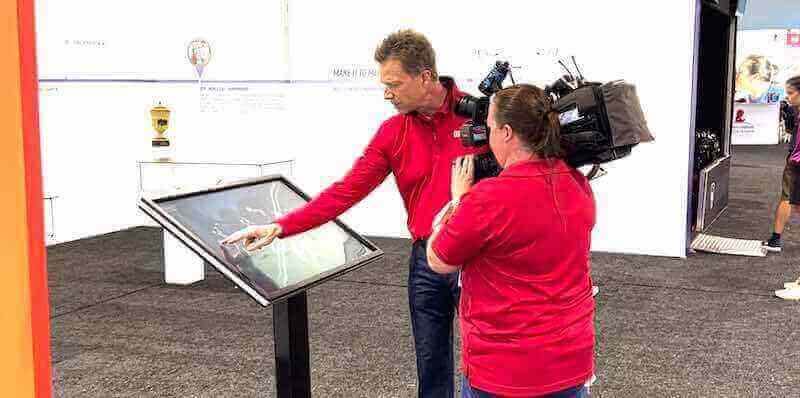
Technology Selection
Choose appropriate hardware and software platforms designed specifically for sports recognition, ensuring intuitive interfaces and robust content management capabilities.
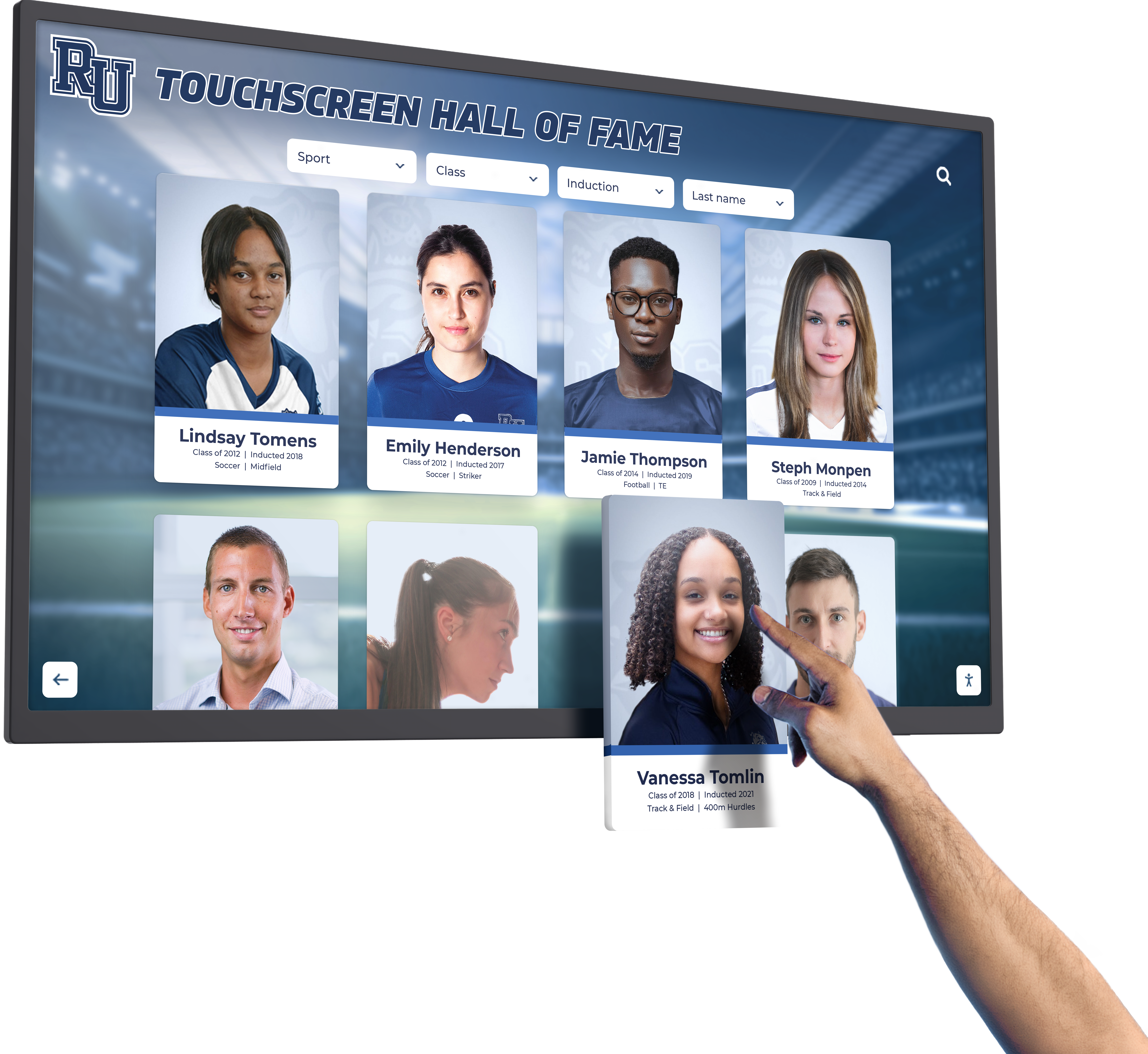
Strategic Installation
Position displays in high-traffic locations throughout Wells Fargo Center maximizing fan exposure while providing appropriate viewing environments for extended engagement.
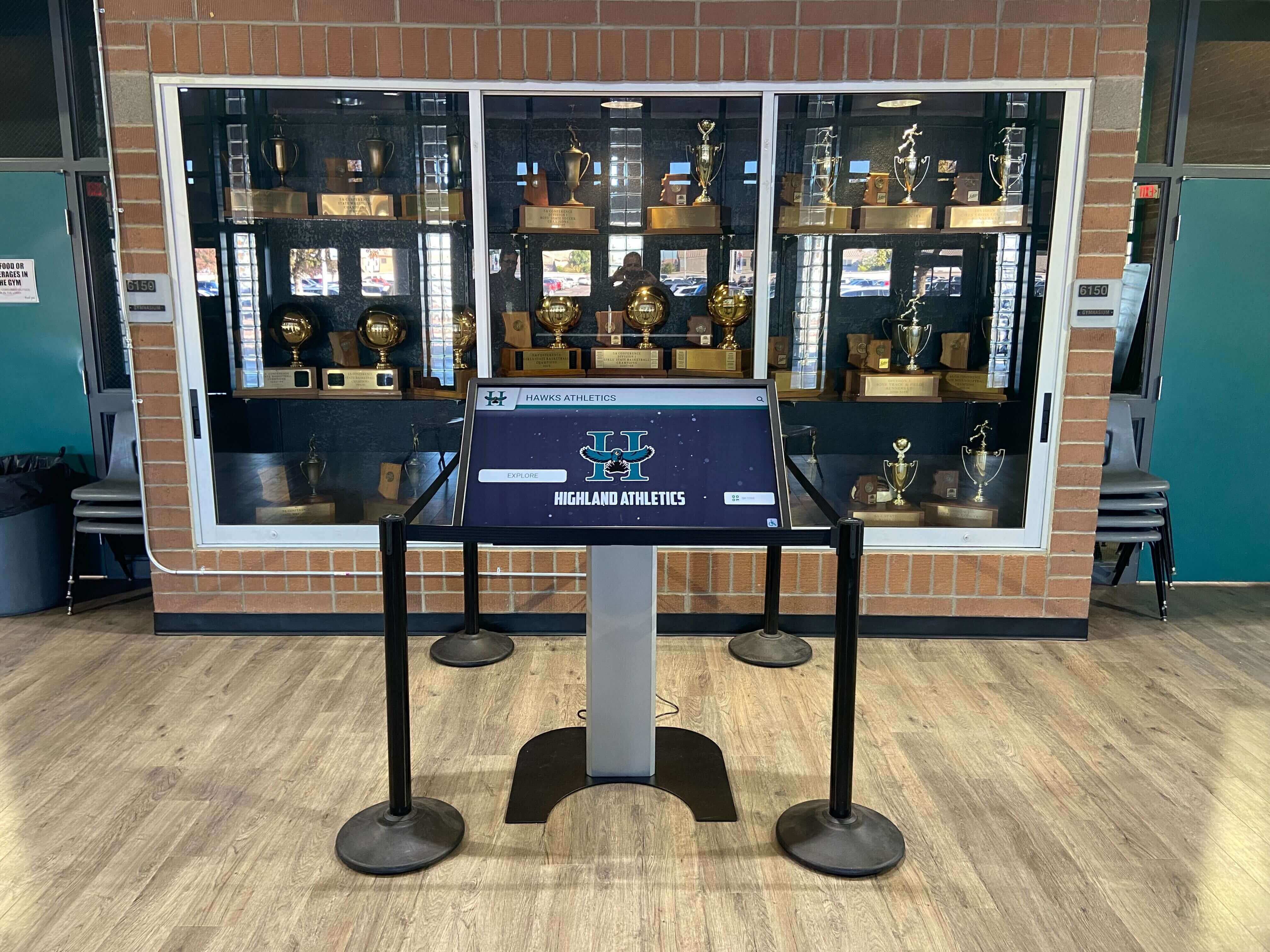
Launch and Promotion
Announce new recognition systems through marketing campaigns, social media outreach, and special dedication events celebrating franchise history and new engagement opportunities.
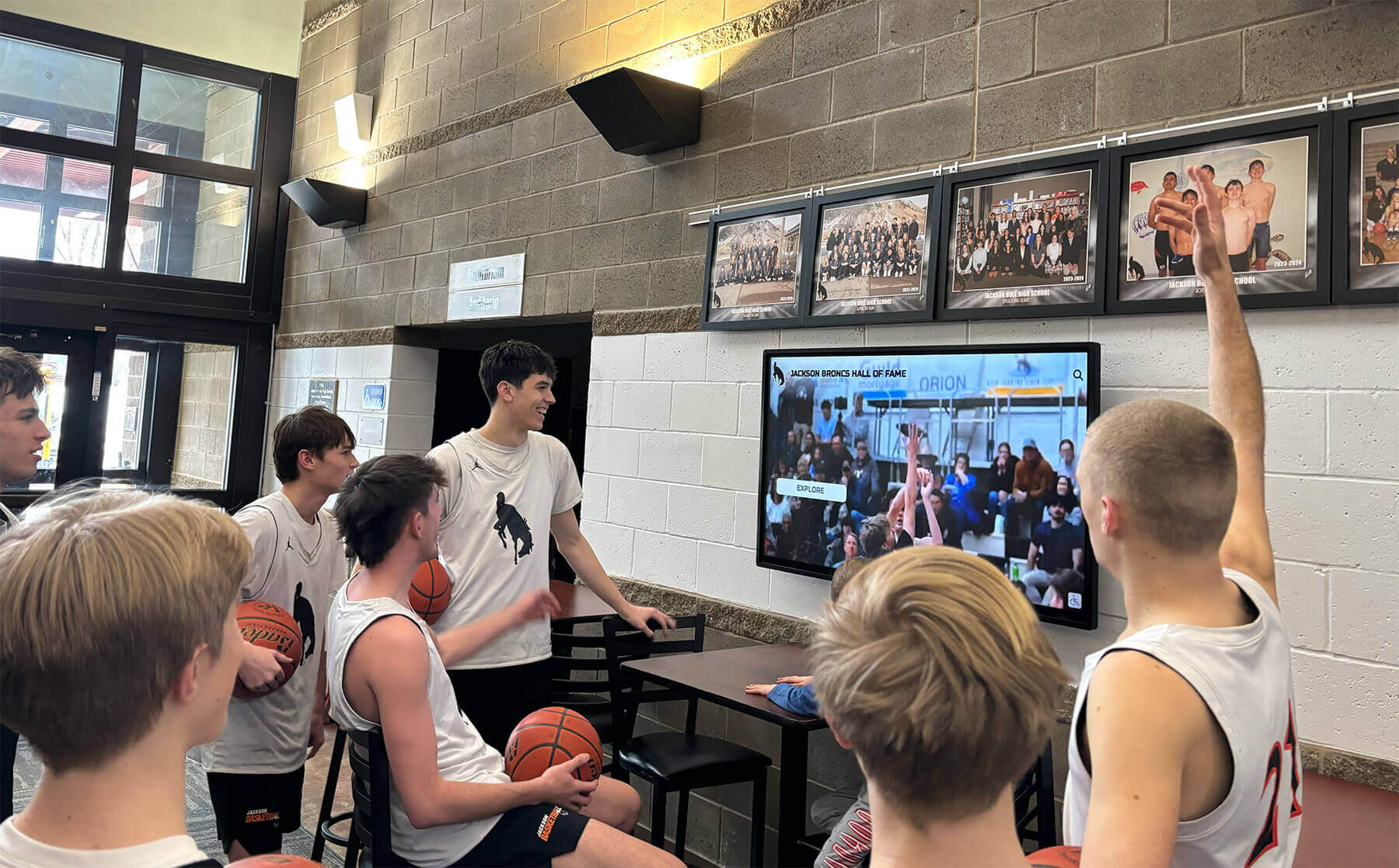
Ongoing Maintenance
Establish workflows for regular content updates, new inductee additions, statistical record changes, and continuous improvement based on fan feedback and usage analytics.
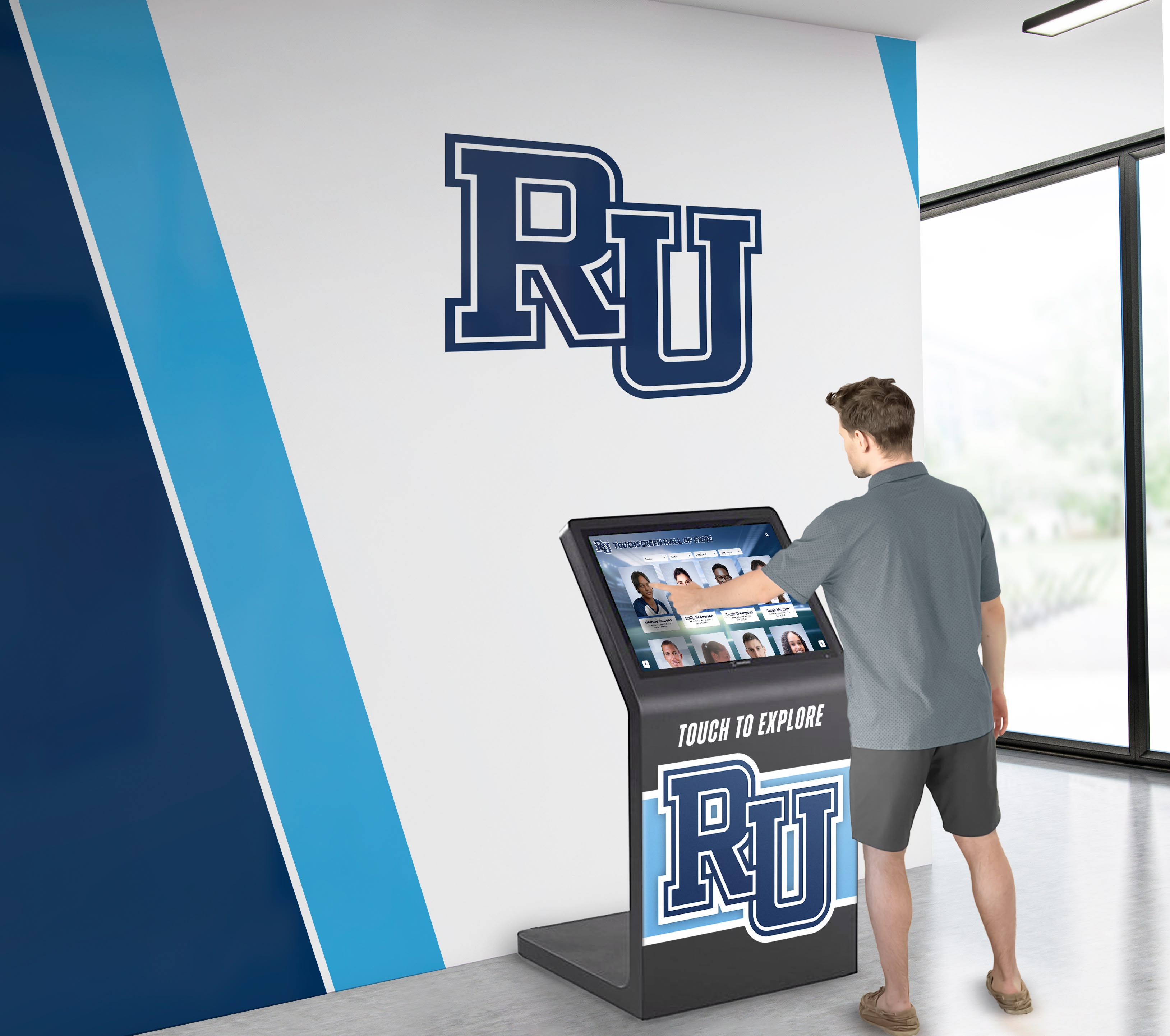
Expansion and Growth
Build upon initial success by adding interactive features, expanding content depth, integrating additional displays, and connecting recognition with broader fan engagement initiatives.
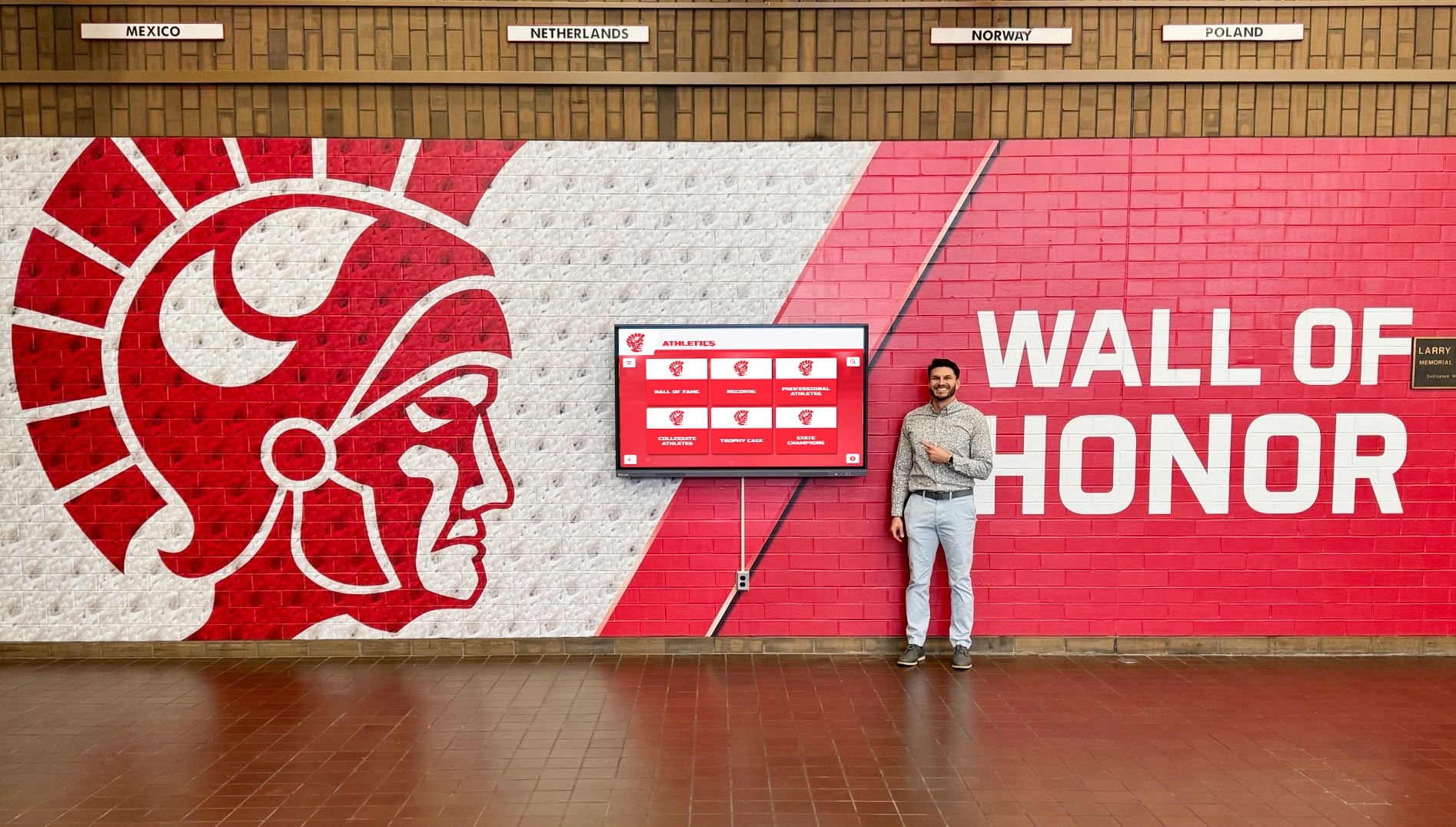
The Business Case for Digital Recognition Investment
Beyond honoring franchise history, digital touchscreen recognition delivers measurable business benefits that justify investment through enhanced fan experience, increased engagement, and competitive advantages.
Enhanced Fan Experience and Satisfaction
Fans attending games at Wells Fargo Center seek entertainment and connection to the franchise they support. Comprehensive historical recognition deepens emotional bonds by demonstrating that the organization values its legacy and respects those who built success.
Interactive displays create positive experiences during pre-game arrival, intermission breaks, and post-game celebrations—times when fans seek entertainment beyond watching hockey. This enhanced arena experience contributes to overall satisfaction, increasing likelihood of return visits and season ticket renewals.
Competitive Differentiation
In a marketplace where multiple professional sports teams compete for Philadelphia entertainment spending, distinctive fan experiences create competitive advantages. Comprehensive digital recognition demonstrates organizational sophistication and commitment to honoring history—qualities that resonate with fans who value tradition and institutional excellence.
Prospective season ticket holders evaluating options compare not just team performance but complete game-day experiences. Superior recognition and historical preservation can influence purchasing decisions among fans weighing commitments.
Marketing and Content Opportunities
Digital recognition generates ongoing content for social media marketing, email campaigns, and promotional activities. Features spotlighting specific players, anniversary celebrations of historic achievements, or “this day in franchise history” segments create regular engagement touchpoints beyond game schedules.
Video content from touchscreen displays can be repurposed across digital channels, maximizing investment value while building consistent brand presence. Historical storytelling humanizes the franchise, creating emotional narratives that complement on-ice competition.
Organizations implementing comprehensive recognition systems discover additional benefits through increased institutional pride and community engagement that extends beyond immediate users.
Rocket Alumni Solutions: Purpose-Built Recognition Technology
Rocket Alumni Solutions provides comprehensive digital recognition platforms designed specifically for celebrating institutional achievements, preserving histories, and engaging communities—capabilities perfectly suited for professional sports franchise needs.
Platform Capabilities for Sports Recognition
Unlimited Content Capacity: Showcase every player, season, achievement, and moment in franchise history without space constraints or per-item costs limiting comprehensive documentation.
Intuitive Content Management: Cloud-based administration enables staff to update content independently without technical expertise or vendor dependency, ensuring timely recognition of new achievements.
Rich Multimedia Support: Seamlessly integrate photos, videos, statistics, biographical narratives, and interactive elements creating engaging experiences that static displays cannot match.
Powerful Search and Filtering: Fans instantly discover specific players, seasons, or achievements through intuitive search functions and advanced filtering by position, era, achievement type, or custom categories.
Responsive Design: Content automatically adapts to different screen sizes—large touchscreens in arenas, desktop computers, tablets, and smartphones—ensuring consistent experiences across platforms.
Analytics and Insights: Detailed usage data reveals which content resonates most strongly with fans, informing content development priorities and demonstrating investment value through measurable engagement.
Security and Reliability: Enterprise-grade infrastructure ensures consistent performance, automatic backups, and protection against data loss or unauthorized modifications.
Supporting Organizations Across Sports
While Rocket Alumni Solutions originally focused on educational institution recognition, the platform’s capabilities translate perfectly to professional sports franchise needs. Organizations implementing comprehensive recognition systems discover that purpose-built platforms deliver superior value compared to generic content management systems or custom development approaches.
The same technologies enabling schools to celebrate hall of fame inductees and championship teams provide professional franchises with scalable, sustainable recognition solutions that grow alongside institutional histories.
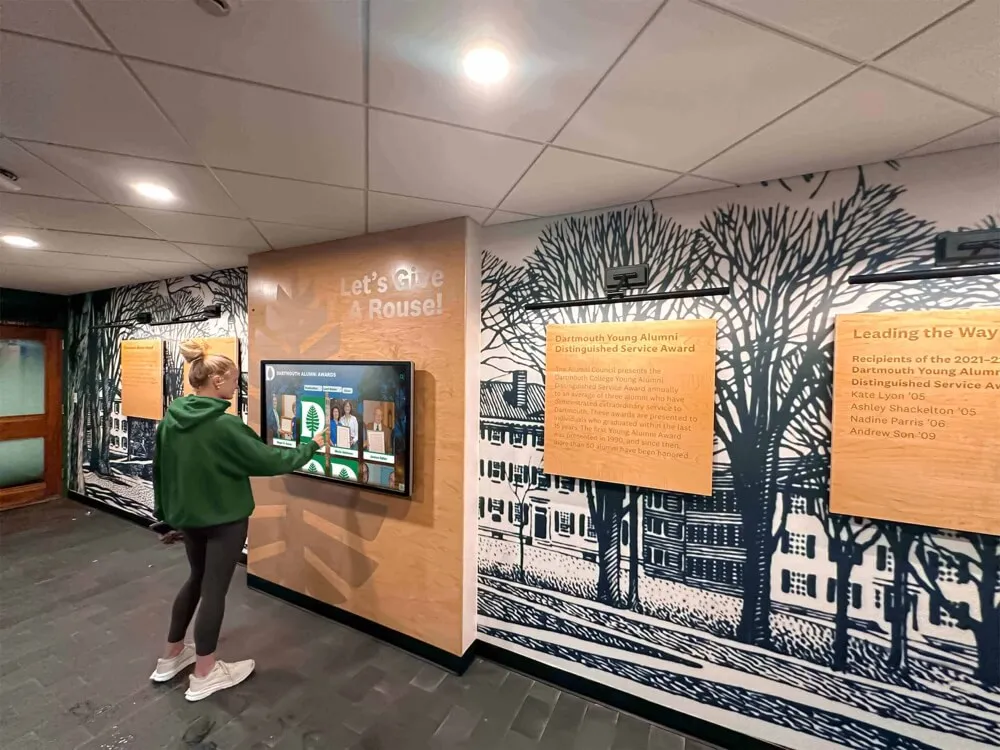
The Future of Sports Recognition: Emerging Technologies
Digital recognition continues evolving as new technologies create enhanced engagement possibilities and deeper fan connections.
Augmented Reality Integration
Future recognition systems may incorporate augmented reality enabling fans to point smartphones at specific arena locations and see historical overlays—championship celebrations occurring in that exact spot decades earlier, retired numbers floating above their rafter positions with expanded information, or historic games replaying on the ice through AR visualization.
Artificial Intelligence Enhancements
AI technologies can enable natural language search (“Show me all players who scored 50 goals in a season”), automated highlight generation from game footage, personalized content recommendations based on viewing patterns, and intelligent cross-referencing suggesting related content fans might find interesting.
Virtual Reality Experiences
Immersive VR could transport fans into historic moments—standing on the ice during championship celebrations, experiencing Bernie Parent’s view making crucial saves, or watching legendary games from unique perspectives impossible in reality.
Social Integration and Community Contribution
Future platforms may enable fans to contribute memories, upload personal photographs from games attended, share stories about meaningful moments, and collaboratively build comprehensive franchise histories incorporating community perspectives alongside official documentation.
These emerging technologies will enhance but not replace the fundamental value proposition of comprehensive digital recognition—honoring achievements, preserving histories, and creating meaningful connections between past excellence and present engagement.
Conclusion: Honoring Flyers Legacy Through Modern Recognition
The Philadelphia Flyers have built one of hockey's most respected franchises through championship excellence, physical dominance, passionate commitment, and sustained competitive achievement spanning more than five decades. From the Broad Street Bullies championship teams through Eric Lindros's Legion of Doom era to modern competitive squads, the orange and black have created countless memories deserving comprehensive recognition and preservation.
Traditional recognition approaches—banners, trophy cases, and wall displays—provide valuable tangible elements but face inherent limitations restricting comprehensive storytelling, fan engagement depth, and adaptation to evolving franchise histories. Space constraints force difficult decisions about what to display versus what to store. Static presentations offer minimal information beyond basic facts. Manual update processes create delays between achievements occurring and recognition appearing.
Modern digital touchscreen recognition technology transforms how franchises can celebrate history by eliminating space constraints enabling complete historical documentation, incorporating rich multimedia bringing moments to life through video and interactive features, providing intuitive navigation allowing personalized exploration, simplifying content management for immediate updates, and extending global reach through web-accessible platforms.
Comprehensive recognition systems honor every player who wore the uniform, celebrate championship teams with detailed documentation, recognize coaching excellence and executive leadership, preserve memorable moments and intense rivalries, and engage fans through interactive exploration creating emotional connections strengthening franchise loyalty.
The investment in digital recognition delivers returns through enhanced fan experiences differentiating game-day offerings, marketing content supporting ongoing engagement campaigns, competitive advantages in entertainment marketplace positioning, and demonstrated respect for history appealing to tradition-minded supporters. Beyond measurable business benefits, comprehensive recognition fulfills an institutional responsibility to preserve legacies, honor those who built franchise excellence, and maintain connections between past achievements and present operations.
For the Philadelphia Flyers and all professional sports franchises committed to honoring their histories while engaging modern audiences, digital touchscreen recognition represents an opportunity to transform how achievements are celebrated, how legends are remembered, and how fans connect with the traditions that define organizational identity.
